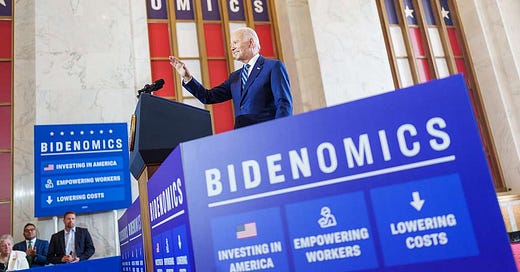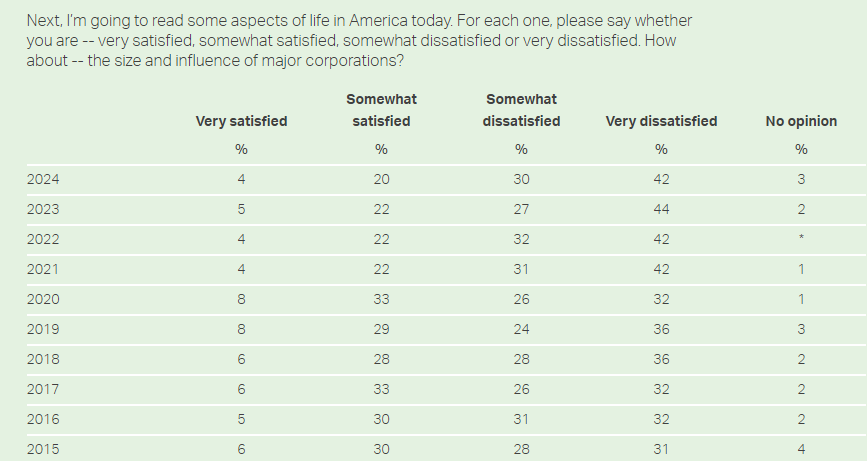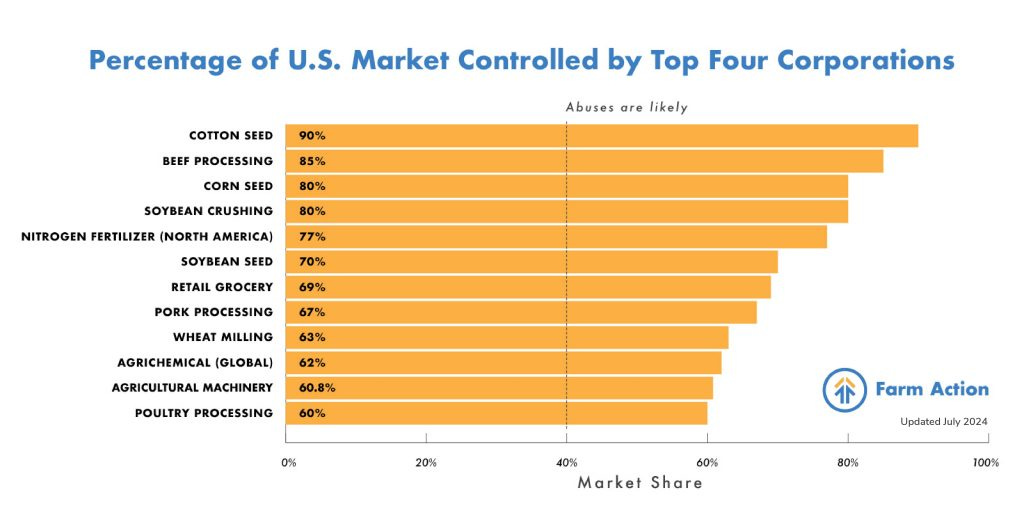You're Probably Getting Screwed by Silicon Valley
The billionaires trying to bring down Bidenomics
Welcome to You’re Probably Getting Screwed, a weekly newsletter and video series from J.D. Scholten and Justin Stofferahn about the Second Gilded Age and the ways economic concentration is putting politics and profits over working people.
There has been a jolt of energy into the presidential race, but I’m not here to talk about coconut trees, brat summer or the K-Hive. Rather the energy I want to focus on is coming from Wall Street and Big Tech. Let’s start with CNBC’s Jim Cramer who on Monday voiced his belief that Vice President Kamala Harris, if elected president, will get rid of staunch antimonopolists like Federal Trade Commission Chair Lina Khan and Assistant Attorney General Jonathan Kanter.
As JD pointed out several months ago, reinvigorating antimonopoly as a central component of economic policymaking will be one of President Biden’s most important legacies. In addition to smart personnel decisions like Khan, Kanter and Rohit Chopra at the Consumer Financial Protection Bureau, Biden’s executive order on competition has catalyzed other parts of the federal government, such as USDA and DOT, to fight corporate power. All told this work has started the process of unshackling us from our corporate masters and putting power back in the hands of workers, small businesses, farmers and families.
How durable is this legacy? Unfortunately that could become a question.
The predictions of a Wall Street mouthpiece like Kramer are one thing, but more concerning is the Silicon Valley donor class, and their supporters, that see Vice President Harris as a potential reset from Bidenomics. They are hoping for what they describe as a more centrist approach (see Matt Yglesias, megadonor Mark Pincus, entrepreneur Aaron Levie), but what that really means is a pro-monopoly platform that recommits to the past several decades of letting powerful corporations do whatever the hell they want.
Just this morning, LinkedIn co-founder and billionaire megadonor Reid Hoffman told CNN he hopes a President Harris would fire Khan, who draws more scorn from monopolists than anyone else in the Administration.
It is worth noting one of the arguments these folks are making is that the only supporters of the Biden Administration’s crackdown on corporate consolidation are lefty academics and policy wonks or as this Democrat Big Tech lobbyist said, Latte Liberals. There is nothing pro-business or pro-innovation about sucking up to monopolists though. Small businesses across this country in rural, urban and suburban communities from local grocers, independent pharmacies, neighborhood bookstores, family farmers and even tech startups are being crushed by monopolies.
Will Silicon Valley billionaires get their way? Unlike Cramer, I’m not here to make any predictions. Frankly there were headlines about President Biden declaring he would be good for Big Tech back in 2020. The more important question to me right now is if this becomes an issue, who will notice? Part of the reason I do this newsletter is that while populist economics is having a moment it hasn’t had in generations, neither party has a monopoly on being antimonopolists yet. Work remains to make this a central part of policymaking, but another four years of Khan and Kanter would be a major step in that direction.
In an election that will already feature plenty of faux-populism, the Vice President would do well to double-down on the actual work that is being done to crack down on corporate power and protect the economic freedom and liberty of everyday people. While talking about antitrust might make most people’s eyes glaze over, Americans of all stripes are increasingly concerned about the extreme power of corporations in our country and are looking for politicians that will do something about it.
Of course this is also a good reminder that the president is just one of the offices on the ballot this year. Did you know that there are 10 state attorneys general races in 2024? Any of those races could have a huge impact on structuring a fairer economy. State legislators also play a key role in this work and thousands of them across the country will be on the ballot in November. A durable antimonopoly movement does not start in DC, it must begin in our communities and reach out to the halls of power.
The coming months might provide an indication of where we are in building such a movement.
YOU’RE PROBABLY (ALSO) GETTING SCREWED BY:
John Deere
In 2024, John Deere eliminated 1,473 manufacturing positions in mass layoffs at its facilities in Iowa. Meanwhile, John Deere CEO John May made $26,285,804 last year…
Reminder, this report shows the Trump Tax cuts encourages companies to ship jobs overseas.
Ag Monopolies
Minimum Wage
It’s been 15 years since the Federal Minimum Wage has been raised.
Big Tech
Why are we worried about Tech monopolies? CrowdStrike’s digital disaster where planes were grounded, hospitals were in disarray, and government services grinded to a halt is why.
SOME GOOD NEWS
Noncompetes
Pennsylvania judge rules in favor of FTC’s Noncompetes Rule.
Stock Ban in Congress
The Senate Homeland Security and Governmental Affairs Committee approved compromise legislation to ban lawmakers from trading stock.
FTC Continues to Look Out for Us
NCAA Antitrust Settlement
We’re eager to find out about the Antitrust Settlement with the NCAA. Shoutout to J.D.’s old law firm Hagens Berman on their leadership in this matter.
BEFORE YOU GO
Before you go, I need two things from you: 1) if you like something, please share it on social media or the next time you have coffee with a friend. 2) Ideas, if you have any ideas for future newsletter content please comment below. Thank you.
Break ‘Em Up,
Justin Stofferahn









